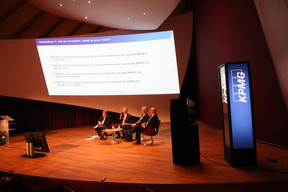Since the onset of the global economic crisis, many in the financial sector have repeatedly said their industry faces a “tsunami” of new regulations. However, “this is not a tsunami,” Charles Muller, investment regulation partner at KPMG in Luxembourg, told the audience at the Philharmonie. “Because you can survive an avalanche if you are prepared and know what’s coming.”
Nevertheless, he pointed out more than nine new major regulations were due to take effect this year and at least 13 in 2013. Although Brussels is driving the regulatory agenda in Europe, Muller noted that most of the new rules are meant to implement decisions made by the G20, the group of the world’s major economic powers.
Many of these plans are tackled by the draft MiFID II bill, which the European Commission submitted to the European Parliament last autumn.
Guest speaker Robert Goebbels, one of Luxembourg’s members of the European Parliament, said that more than 2,100 proposed amendments had been put forward by the time the parliamentary comment period closed last Thursday. “I was approached by 170 lobbies who wanted to see me” about the bill, recounted Goebbels, who sits in the parliament’s progressive alliance of socialists and democrats group. “But I only saw about a dozen, because you can’t discuss it with everyone.”
Goebbels reckoned that the European Parliament and Council of European finance ministers would reach a final agreement “by the end of this year; at least that’s our ambition.”
MiFID II aims to “ensure a level playing field in the market, increase market transparency, and address the organisational deficiencies observed during the financial crisis,” explained Anne-Sophie Minaldo, an audit, regulatory and compliance director at KPMG in Luxembourg.
Yet one proposed provision carries the “risk of opening the Pandora’s Box of casting doubt on UCITS,” warned Jean-Michel Loehr, industry and government relations chief at RBC Dexia Investor Services and board member of the fund association ALFI. The MiFID II draft would split all types of investment products into “complex” and “non-complex” products, the former suited for more sophisticated investors and the latter for all retail investors.
Whereas today all UCITS mutual funds are essentially treated as non-complex products, this could change if the MiFID II draft is adapted. Indeed, there would be two categories of UCITS. Loehr reckoned that would send a confusing message to consumer investors and ultimately diminish the UCITS brand.
Goebbles said he had tabled an amendment to avoid the categorisation of UCITS funds, but could not predict if it would ultimately be adapted by the European Parliament.



























































